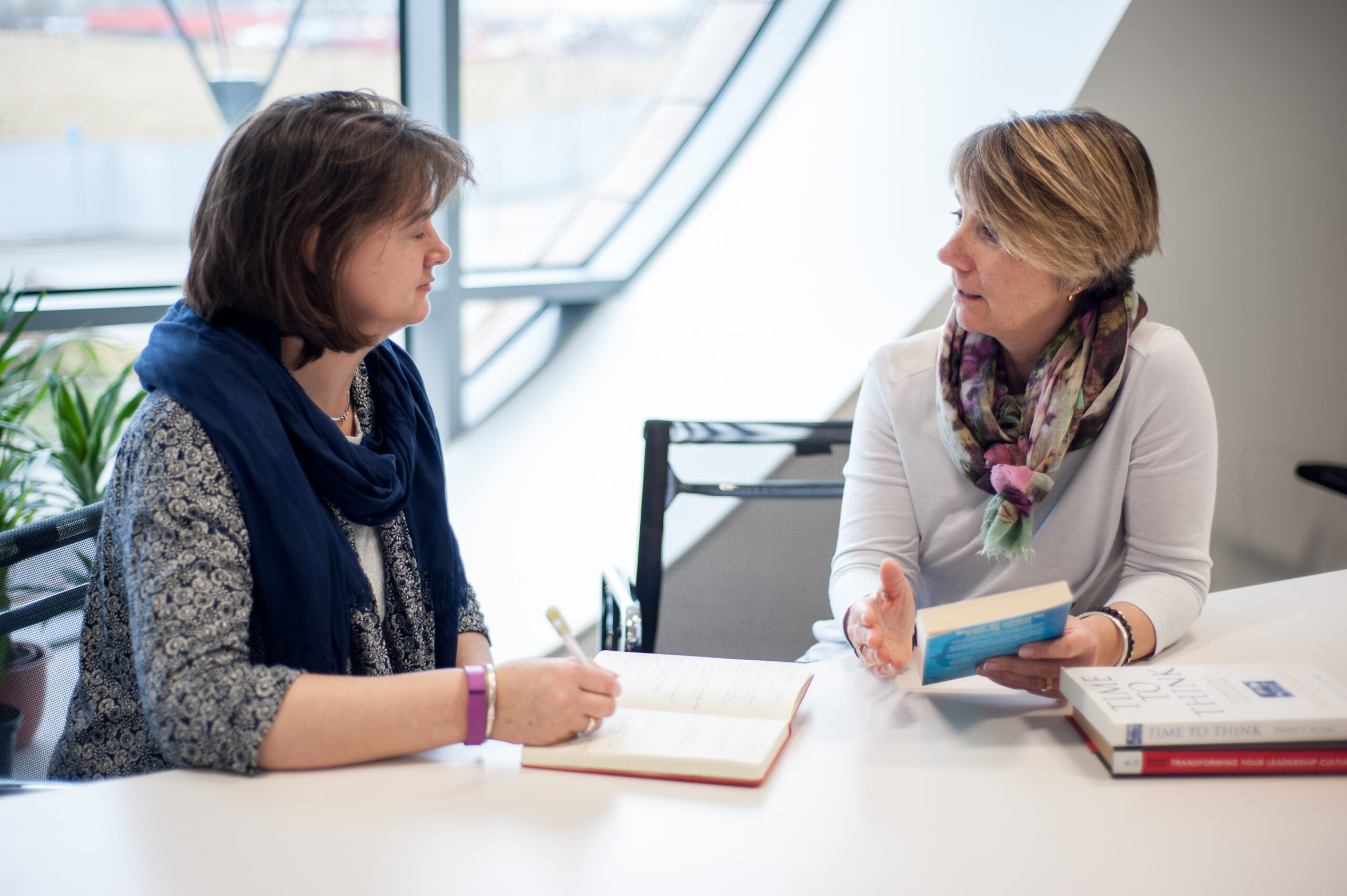
“I’ve worked with Julia for a number of months now and I’m consistently able to draw upon a store of resilience I’d forgotten I had. By remembering and realising my strengths, I’ve found that I actually like myself again. There’s a new clarity in my approach to my work and I feel comfortable in my own skin.”
The Head teacher’s Story - “My school was judged to be inadequate”
Kristin is the head teacher of a high school, judged to be inadequate by OFSTED. She came to Julia looking for an outside perspective on her situation.
Feeling a strong sense of failure and professional shame, Kristen said she had had “lost confidence” in her position as the school’s Head teacher. She and Julia met every two months over the period of a year, to give the ideas and actions they aired, discussed and agreed on time to take root in Kristen’s working life.
“Instead of facing the situation, I realised I had made myself very, very busy on the paperwork side of the job. I hid myself away in my office. That way I knew I wouldn’t have to face the staff, the parents or the children. I used the paperwork as a barricade. A place to hide away, and as a thing to hide behind.”
After the first meeting Julia made sure that Kristen had a solid objective that she could achieve before they came together again. As an initial step, they talked about how Kristen had immersed herself in her paperwork as a way of hiding, of getting away from the other members of staff at the school. Her level of professional shame was intense and had spilled over into her home life.
“After the announcement? I couldn’t even bring myself to tell my parents what had happened.”
Julia talked about the idea of delegation and how, by taking responsibility for all the paperwork that landed on her desk, Kristen had stopped ‘managing her monkeys’. In other words, due to the sheer volume of the demands being placed on her, each issue and problem was effectively a monkey demanding her attention. This was allowing Kristen to stay stuck as she tried to firefight each of the screaming demands, instead of sharing the problem with her team.
Kristen was able to see how by delegating, with clear instructions and support, she could set some of these demanding ‘monkeys’ free. Julia even broached the idea that some of them could be metaphorically 'killed off’, never to bother Kristen or anyone else again.
Six months after her school’s initial inspection, Kristen received a monitoring letter from OFSTED. Although it contained many positives, Kristin focussed on the ‘areas for development,’ seeing them as further criticism and evidence of her failure. Together Julia and Kristen worked on reframing her perspective on the letter’s contents.
“I realised that to move forward, I needed to forgive myself for the situation and to look at how I could start to take positive steps with my staff, instead of hiding away from them.”
By reframing it, Kristen was able to look at the contents of the letter as opportunities for change and possible development, instead of as additional criticism – and a list of yet more challenges that she needed to overcome.
At this meeting Julia asked Kristen how she could start to build bridges into her professional network as a means of actively seeking out support from her peers, rather than hiding from them.
At the next meeting Julia talked about the idea of leading by example and modelling positive leadership. This was a distinct change from Kristen’s previous ‘rabbit in the headlights’ response to her situation. Working together and then with her colleagues, Kristen began to develop a public narrative of the school’s situation and was able to use rhetorical devices to engage with her staff. She showed them that she believed they could effect a positive change within the school.
Kristen had managed to shift her feelings from sympathising with the staff – and, in the process, shouldering the blame herself – to empathising with them in the face of a challenging situation.
The idea that with hard work and a team effort the school could be open to new opportunities was a powerful one. The staff engaged with the options Kristen presented: they could put their heads in the sand and stay where they were, or work hard to develop new and positive opportunities.
“Using the public narrative tool? That was the start of my beginning to lead by positive example. A major change – and a turning point.”
Kristen received a strong and overwhelmingly positive response from her colleagues, setting changes in motion that revealed the choices that were available to them, under her newly engaging leadership.
One of Kristin’s signature strengths is her professional integrity. The perceived attack on this strength with the OFSTED judgment explained why it had had such a devastating effect on Kristen’s sense of herself in her workplace.
A quality that was at the core of her being had suffered an attack, and in the process had floored her and been transformed into an excruciating and destabilising weakness.
Julia and Kristen worked together to look at Kristen’s underused strengths and to build her levels of personal and professional resilience. By thinking of Kristen’s resilience as an entity akin to a squash ball, she was able to accept that it’s alright to be ‘soft’ at times and that this softness, this level of vulnerability and openness, would make her stronger for the future. Like a squash ball, the harder it’s hit the higher it bounces. And it comes back again and again.
“I began to understand that the knockback I’d endured from the OFSTED judgment could actually be turned into something positive, something that would allow me to create opportunities in the future – both for myself and my staff.”
Kristen’s key takeaway from this session was the idea that she could use the reframing skills she and Julia had developed together with her staff.
“Instead of hearing my colleagues saying ‘I can’t’ and agreeing with them, because I felt so wretched about the situation, I began to say ‘Yes and,’ So they might have said, ‘I can’t do this because…’ and I would say, ‘Yes and look at how well you handled this. And I think you can do the same here…’ Suddenly people understood that they could expand the work they were doing well to cover other aspects of their role.”
The work that Kristen has done has allowed her to look ahead and to start to move forward from her position of fear and shame. She is now feeling more positive and is looking for external quality assurance for the work she’s doing.
“I’m feeling stronger. And I’m now able to think about looking outside my immediate contacts for some feedback that what I’m doing is along the right lines for where I want to be and where I want the school to be. I’m ready to seek out some external peer support to give me a real sense of my own judgment. Something I just wasn’t able to think about before working with Julia.”
Kristen is now able to see that by coming back from the very bottom of a situation and accepting it for what it was has made her stronger. She’s able to recognise that her denial of a number of aspects of the situation were not, in fact, helping her and she’s moved forward and onwards from them.
Her work with her colleagues is now much more productive and positive.
“There’s a real sense that we’re doing the right things for the right reasons. I’ve remembered why I wanted to work in education, after forgetting the real reasons in my blur of the stress, and I can enjoy my position once again.”

Through the coaching process Kristin has made the shift from hearing challenge as criticism and taking it personally, to being resilient and secure enough to hear challenge as opportunity.
Six bi-monthly two hour face to face sessions, com
Case Studies